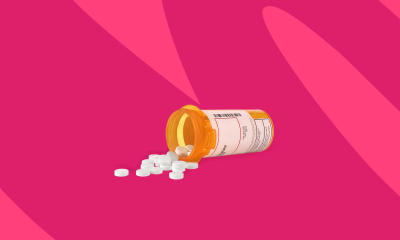Health
What are the benefits of parsley?

Discover the benefits of parsley for Health.
Parsley is one of the most popular herbs in the kitchen, as it brings a touch of color and flavor to meals. Of Mediterranean origin, parsley has managed to transcend borders until it is present in all corners of the world.
It is rich in calcium, folic acid, iron, and vitamins A, C, and K. If you want to know all the benefits that parsley has, you just have to keep reading.
Health Benefits of parsley
Parsley, in addition to being an excellent condiment for meals, is also an excellent complement to have a healthy life. This is because parsley provides great health benefits.
Provides a large number of flavonoids
It helps fight diseases and protect the body from the risk of suffering from many pathologies thanks to its antioxidant effects.
Among its main contributions to the body are beta-carotene, alpha-carotene, luteolin, lycopene, and apigenin.
In addition, they help slow the aging of cells by eliminating free radicals, reducing inflammation and the risk of diseases associated with old age.
Contains essential oils
It provides a large number of essential oils to the body that contains volatile components such as limonene, myristicin, eugenol, and alpha-thujene, which help fight cancer, strengthening the immune system, and helping it respond better.
It also delays the growth of tumors, fights carcinogens, and neutralizes oxidative stress, which is why it is considered a chemoprotective plant, as it also helps to keep DNA free from damage, stopping mutations at the cellular level and promoting the death of cells. damaged cells.
It is diuretic
Parsley acts as a quite effective natural diuretic that helps reduce bloating by stimulating kidney production, helping to eliminate excess fluid that may be swelling the abdomen, while helping to preserve digestive health.
Fluid retention at the abdominal level can cause problems in the digestive process, which is why parsley is quite useful to relieve stomach discomfort while reducing inflammation and helping to obtain a visibly flatter abdomen.
Improves urinary tract health
Parsley is highly effective in helping to reduce kidney stones and their subsequent excretion naturally. Relieves symptoms of urinary and gallbladder infections.
Even in cases of venereal diseases and jaundice, it has been scientifically proven that the root and leaves of parsley help the spleen and liver function.
Improves digestion
It is one of the most common uses of parsley when it is used as a medicinal plant, as it helps to relieve stomach symptoms quite effectively. It helps reduce gas, nausea, constipation, bloating, and even in cases of indigestion.
Parsley helps the production of bile and gastric juices, thanks to its essential oils, which help improve the absorption of nutrients that come from food. Its essential oil can be used applied directly on the abdomen or as part of baths.
It is antibacterial and antifungal
Parsley has antibacterial and antifungal properties that help fight infections and eliminate bacteria, which is why it is widely used to preserve oral and dental health, as well as that of the skin, being a perfect ally to help eliminate acne and the bacteria that cause it.
It eliminates fungi effectively, being applied directly on the affected area, however, the essential oil of parsley can be irritating, so its application is recommended, diluting it in another oil that serves as a base, such as oil of olive, coconut, or almonds.
Due to these characteristics, parsley is present in the formulation of many soaps, creams, perfumes, and detergents.
Fight bad breath
Thanks to its antibacterial properties, previously mentioned, parsley helps fight the bacteria that cause bad breath, helping to refresh it naturally.
Chewing a parsley leaf for a few minutes is more than enough to eliminate any trace of bad breath that you may have.
Protect bones
Parsley is highly rich in vitamin K, which helps to preserve bone density, together with calcium, vitamin D, and phosphorus.
Stimulates the immune system
Thanks to its high content of vitamin C, which acts together with phosphorus, magnesium, and vitamin D. Its antioxidants, among which vitamin A stands out, help to increase the defenses naturally.
Taking all these vitamins and minerals helps maintain optimal intestinal health while reducing inflammation, which means a lower risk of diseases such as arthritis, arteriosclerosis, diabetes, asthma, and colon cancer.
Improves eye health
Parsley helps protect and improve eye health thanks to its vitamin A content, which also helps maintain healthy skin. The high content of carotenoids and beta-carotene help promote visual health while protecting the cornea and retina from the damage to which they are exposed with the passage of age.
That is why parsley helps prevent the appearance of various visual disorders caused by cell degeneration, such as cataracts. It also helps prevent skin cancer by protecting the skin from UV rays.
Helps protect the heart
Parsley provides folate, which is essential for maintaining heart health, as well as B vitamins that protect you from disease. Parsley provides large amounts of folic acid that converts homocysteine, a substance that, if left unchecked, can be detrimental to heart health.
This substance can damage blood vessels and cause a stroke or heart attack if left unchecked, which parsley does effectively.
Balances hormones
The consumption of parsley helps to balance hormones, helping to reduce the incidence of other pathologies and improving fertility.
In addition, it helps to alleviate premenstrual symptoms, reduce colic, and, by providing folic acid, it helps to cover the amount of folate necessary for the correct formation of the neural tube during pregnancy, avoiding later problems in the fetus.
Health
7 shocking health benefits of maqui

Table of Contents
Health
3 Benefits of salt water and side effects

Discover the 3 shocking health benefits of salt water and side effects.
Sometimes the best remedies in life are the simplest. This is true of an ancient skincare hack known for tightening pores, balancing oil production, and rejuvenating skin.
You won’t need fancy skin creams packed with chemicals and preservatives to achieve a youthful glow after this.
You can start to improve the quality of your skin with just two things: purified water and high-quality salt, and you will see how the benefits of saltwater will work miracles for you.
Health Benefits of saltwater
Since saltwater therapy has been used for centuries throughout the world, including ancient Greece, there is strong anecdotal evidence that it works wonders on the skin.
A handful of studies have found the saltwater bath to be particularly effective for troublesome skin conditions, such as psoriasis.
Saltwater is said to benefit your skin in the following eleven ways:
• Closes open pores
• Absorbs excess oil
• Balances oil production
• Kills acne-causing bacteria
• Diminish scars
• Heals scratches and cuts
• Exfoliates dead skin cells
• Restores the natural pH of the skin
• Improves the barrier function of the skin
• Improves hydration
• Reduces inflammation
1.- Benefits of salt water for acne
If you are lucky enough to live near the ocean, you may already know this beauty secret.
But if you don’t live on the coast, just fan warm salt water the next time you have an outbreak.
Try mixing a cup of purified water with a tablespoon of sea salt.
Use a cotton ball to gently apply saltwater to acne and allow it to dry.
By the way, if you try this treatment and your acne still isn’t clearing up within a day or two, maybe your diet is to blame.
Make sure to avoid sugar, processed junk, gluten, peanuts, yeast, and dairy for a while to see if your skin clears up.
Eat plenty of green leafy vegetables, lean protein sources, and healthy fats like coconut oil and avocados; your skin and waist will thank you.
2.- Benefits of salt water for scratches
If you’ve ever heard the expression “throwing salt on a wound,” you probably aren’t very interested in putting salt water near your scratches.
However, this treatment can be beneficial in killing harmful bacteria and speeding up the healing process.
Research shows that bathing in magnesium-rich Dead Sea salt improves the skin’s barrier function, improves skin hydration, and reduces skin inflammation, which are all the things you’ll need if you have a cut or scratch.
Fill your bathtub with warm water and pour in a cup of sea salt.
Take the experience to the next level by adding 10 drops of lavender essential oil.
The scent will promote a deep sense of relaxation – you may even feel like you are in a spa!
3.- Drink salt water to heal from the inside out
The good thing about salt water is that there are many ways to use it. A glass of warm salt water, called “Sole,” is a great way to start your day and promote internal healing.
As long as you use a natural form of salt (and avoid drinking seawater), it will promote hydration, facilitate digestion, reduce inflammation, improve your sleep, detoxify your cells, improve your bone health, and more.
What does salt do to the body
We rarely think about what goes into nature’s most common treasures, like salt.
This natural mineral comes directly from the earth, formed into crystals from a combination of sodium and chloride.
It is found naturally in seawater, making up at least three percent of our world’s oceans. And when seawater is trapped, the water evaporates and leaves salt crystals.
Despite what you may have heard about sodium and your health, a natural source of salt contains vital nutrients that are important for maintaining optimal well-being.
First, salt provides key minerals like sulfur, calcium, sodium, magnesium, silicon, boron, potassium, bromine, and strontium.
With its rich mineral content, salt can help you lose weight, reduce asthma symptoms, improve blood sugar levels, and regulate heart health.
However, keep in mind that not all salts are created equal. Table salt, for example, is highly processed and bleached before it reaches that little glass bottle.
Unfortunately, during mass production, manufacturers strip you of everything good for your health.
The result is a product that does not resemble its original form and can even harm your health. When doctors warn against consuming too much salt, table salt is what they mean.
For your skincare routine and general health, try using these unprocessed varieties:
Sea salt for skin
Natural sea salt contains the many minerals our bodies need, such as magnesium, calcium, sodium, and potassium.
All of these play a role in the health of our skin, allowing cells to communicate with each other and heal problems that arise.
When you don’t have enough minerals, you will see annoying symptoms like dry skin, dullness, irritation, and blemishes.
Fortunately, sea salt can naturally enhance hydration and strengthen the outer layer of your skin to keep it looking healthy.
Himalayan pink salt for skin
Despite the name, there are no salt mines in the Himalayas. The pink salt slabs come from the Khewra Salt Mine in Pakistan, about 300 miles west of the Himalayas.
As the second-largest salt mine in the world, people have been collecting this commodity for more than 2,000 years.
Only in the last decade has it become popular in Western culture. Salt is made up of 95 percent sodium chloride.
The rest is a mixture of polyhalite and other minerals, which give the salt its characteristic pinkish hue.
Due to the lack of processing, it still contains the beneficial minerals that your skin will love.
As you can see, saltwater provide a series of skincare benefits, so if you want to show off shiny and well-groomed skin, do not hesitate to follow each of the tips in this publication step by step.
Health
12 Benefits of Jamaica flower and side effects

Table of Contents
-

 Benefits5 months ago
Benefits5 months agoThe Benefits of Joining Gym Lumolog – Improve Your Fitness & Health
-

 Food1 year ago
Food1 year ago10 + Benefits of carrot juice and side effects
-

 Health1 year ago
Health1 year ago50 Super Healthy (And Very Often Cheap) Foods
-

 Health1 year ago
Health1 year ago5 Shocking health benefits of kinkeliba and side effects
-

 Health1 year ago
Health1 year ago15 health benefits of soursop leaves tea and side effects
-

 Food1 year ago
Food1 year ago8 shocking benefits of leek juice and side effects
-

 Health1 year ago
Health1 year ago15 Benefits of lipton tea and side effects
-

 Health1 year ago
Health1 year agoBenefits of guava leaves Sensually












